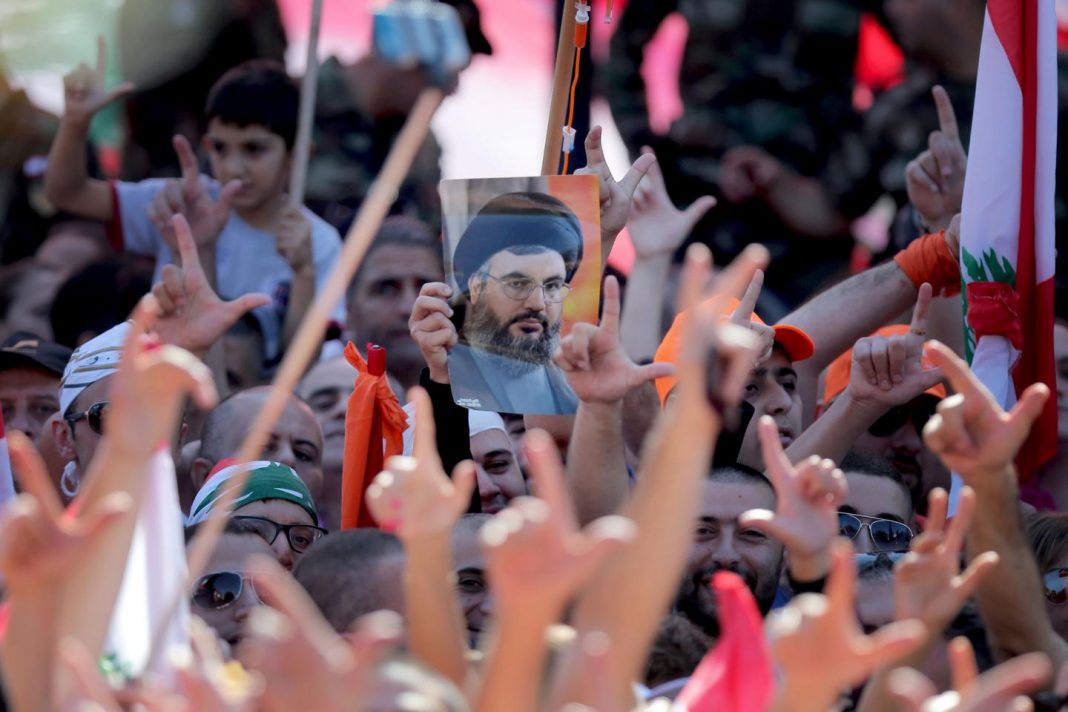إذا استثنى الأسد سيُمَكِّنُ “حزب الله”
ديفيد داود/النهار/المصدر: “النيوزويك” ترجمة نسرين ناضر/17 كانون الأول 2016
حقّق “حزب الله” إنجازاً في أواخر تشرين الأول الماضي عبر إيصال مرشحه المفضل، ميشال عون، إلى رئاسة الجمهورية اللبنانية. واليوم يتجه الحزب إلى الإفادة بطريقة غير مباشرة من نتائج انتخابات أخرى جرت على بعد ستة آلاف ميل: الانتخابات الرئاسية الأميركية.
المسألة ليست أن الرئيس المنتخب دونالد ترامب مولعٌ بـ”حزب الله” – الذي أراق دماء مئات الأميركيين – أو بأسياده الإيرانيين. على النقيض، لقد تعهّد بشلّ الحزب عبر “تجفيف” منابع تمويله. لكن ترامب أثار مراراً وتكراراً، خلال حملته الانتخابية العاصفة، شكوكاً حول صوابية الإطاحة ببشار الأسد – الداعِم الثاني الأساسي للحزب بعد طهران – في الحرب الأهلية الدائرة في سوريا. وعلى الرغم من التهديد الواضح الذي يشكّله تنظيم “الدولة الإسلامية” (داعش) على المواطنين الأميركيين والمصالح الأميركية، فإنه في حال انتهج ترامب استراتيجيةً تقوم على محاربة التنظيم، إنما مع استثناء الأسد وعدم الدخول في مواجهة معه، فسوف يؤدي ذلك، عن غير قصد، إلى وضع “حزب الله” في موقع قوة لا سابق لها في لبنان، قاعدته الأساسية.
لقد سجّل الحزب هدفاً في لبنان من خلال انتخاب عون رئيساً للبلاد. كسبَ عون، المسيحي الماروني، صداقة التنظيم الشيعي عبر المواظبة على اعتماد سياسات تدعم طموحاته الداخلية والإقليمية. وقد ردّ له “حزب الله” الجميل عبر تعطيل العملية السياسية في لبنان على امتداد عامَين، إلى أن وافق خصومه على انتخابه رئيساً للجمهورية. والآن، حتى بعد إنجاز الانتخابات، يبدو أن “حزب الله” يعرقل تشكيل الحكومة الجديدة برئاسة سعد الحريري الموالي للغرب بهدف الضغط والحصول على تنازلات كافية تضمن سيطرته على الحكومة.
ومثلما تمكّن “حزب الله” من إيصال مرشحه إلى الرئاسة في لبنان، يلتزم أيضاً إبقاء الرئيس السوري الأسد في سدّة الحكم في دمشق. وفي هذه المسألة تحديداً، قد يصبح ترامب – على الرغم من الوعود التي أطلقها بمعاقبة الحزب وأسياده الإيرانيين – شريكاً لـ”حزب الله” عن غير قصد منه.
لقد صرّح الرئيس المنتخب أن تنظيم “الدولة الإسلامية” أشد خطورةً من الأسد على الولايات المتحدة. يبدو أن تلك النظرة تتجاهل تحالف الرئيس السوري مع إيران، والميليشيات الشيعية التي تقاتل في سوريا والتي تلطّخت أيديها بدماء مئات الجنود الأميركيين. يستشهد ترامب بالسوابق العراقية والليبية والمصرية للإشارة إلى أنه من شأن تنظيم “الدولة الإسلامية” أو متطرّفين آخرين الحلول مكان الحاكم في حال إسقاطه، ولذلك يعارض العمل العسكري ضد النظام السوري. وقد أبدى الأسد، بصورة غير مفاجئة، ترحيباً بكلام ترامب، واصفاً الرئيس المنتخَب بـ”الحليف الطبيعي”، وأعرب المسؤولون في نظامه عن استعدادهم للتعاون مع الإدارة الأميركية العتيدة. بالمثل، يُتوقَّع أيضاً أن تتحسن حظوظ “حزب الله”. لقد عمد الحزب، حفاظاً على تفوّقه العسكري والسياسي في لبنان – وعلى بقائه تحديداً – إلى دعم الأسد خلال الحرب الأهلية السورية المستمرة منذ خمسة أعوام ونصف العام. طوال هذه المرحلة، قاتل الحزب بضراوة، وساهم – مع الحرس الثوري الإيراني – في تسهيل تدفّق آلاف المقاتلين الإيرانيين إلى سوريا لخوض حربٍ بالوكالة هناك. خسر “حزب الله”، منذ عام 2013، 1600 مقاتل في سوريا، في مقابل مصرع 1200 من عناصره في المواجهة مع إسرائيل بين عامَي 1985 و2000. هذا الحزب الذي كان في ما مضى محبوب العالم العربي لخوضه مواجهة مع الدولة العبرية، تحوّل إلى منبوذ بسبب دعمه للأسد، وقد فرضت عليه جامعة الدول العربية ومجلس التعاون الخليجي عقوبات بعد تصنيفه في خانة المنظمات الإرهابية.
غير أن تلك التضحيات، وعلى الرغم من أنها مؤلمة، لم تشكّل رادعاً للحزب، لأنه قد يتكبّد أثماناً أغلى بكثير في حال سقوط الأسد واستبداله بنظام سوري معادٍ ذي أكثرية سنّية.
دمشق هي بمثابة شريان الحياة الذي يربط “حزب الله” بإيران، فهي تؤمّن تدفّق الأسلحة الإيرانية إلى الحزب كما أنها تشكّل محطةً للمقاتلين المتوجّهين إلى الجمهورية الإسلامية من أجل الخضوع لتدريبات متقدّمة. وسوريا هي أيضاً بوّابة الحزب إلى العراق حيث أنشأت “الوحدة 3800” التابعة لـ”حزب الله”، على امتداد أكثر من عقد من الزمن، ميليشياتٍ شيعية للمساعدة على تنفيذ المشروع الإيراني في المنطقة – وقد كانت هذه الميليشيات وراء مقتل المئات من الجنود الأميركيين. كما أن الأسد يحمي “حزب الله” من الخصوم الإقليميين مثل إسرائيل والدول العربية السنّية، فضلاً عن القوى السياسية اللبنانية الموالية للغرب، فهذه الحماية هي جزء أساسي من “محور المقاومة” الإيراني. علاوةً على ذلك، تصرّفت دمشق، على امتداد عقدَين ونيّف، في موقع الضامنة لهيمنة “حزب الله” على لبنان، وكذلك باعتبارها العمق الاستراتيجي للحزب خارج الحدود الضيّقة لوطنه الأم. حتى بعد انسحاب القوات السورية من لبنان خلال ثورة الأرز عام 2005، استخدم الأسد أجهزته الاستخبارية ولجأ إلى عمليات الاغتيال والضغوط السياسية لإضعاف خصوم الحزب الشيعي. ويستمر اليوم في تزويد الحزب بالأسلحة الروسية والمحلية الصنع ويؤمّن له قواعد لتخزين السلاح.
من شأن انتصار الأسد أن يضع حداً للتهديد الوجودي الذي تشكّله الحرب السورية بالنسبة إلى “حزب الله”، ما يؤدّي إلى تحرير الموارد الهائلة التي وظّفها الحزب في ذلك النزاع. وبعدما ضمنَ التنظيم سيطرته في لبنان مع انتخاب عون رئيساً للجمهورية، بات بإمكانه أن يكرّس طاقته بصورة أكبر لتهديد حلفاء واشنطن وتقويض مصالحها في المنطقة من أجل تدعيم المصالح الإيرانية – كما فعل في العراق واليمن. لقد قتل تنظيم “الدولة الإسلامية” مواطنين أميركيين داخل الولايات المتحدة وخارجها، وقوّض المصالح الأميركية، وهددّ حلفاء الولايات المتحدة مثل مصر وإسرائيل والسعودية والأردن. إذاً ما يسعى إليه ترامب، أي استخدام القوة العسكرية الأميركية لإلحاق الهزيمة بتنظيم “الدولة الإسلامية”، هو هدفٌ سليم. غير أن القيام بذلك مع السماح في الوقت نفسه للأسد بالبقاء في السلطة قد يحوّل الهدف الجدير بالثناء المتمثل في تدمير “الدولة الإسلامية” خسارةً استراتيجية واضحة لواشنطن. فبدلاً من إضعاف “حزب الله” وقطع إمداداته، من شأن هذه المقاربة أن تؤدّي إلى تمكين الحزب، العدو اللدود للولايات المتحدة الذي أثبت أنه تهديد كبير يُخيّم على رؤوس الأميركيين.
**محلل في “مؤسسة الدفاع عن الديموقراطيات” بواشنطن
A Donald Trump Anti-Isis Campaign That Spares Assad Would Only Empower Hezbollah
Donald Trump Contradicts Running Mate Mike Pence On Syria
David Daoud/News Week/December 12/16
In late October, Hezbollah scored an achievement by pushing through its favored candidate, Michel Aoun, to the Lebanese presidency. Six thousand miles away, the group now stands to indirectly benefit from the results of another election: America’s.
It’s not that President-elect Donald Trump has any love for Hezbollah—which has spilled the blood of hundreds of Americans—or for its Iranian patron. On the contrary, he has promised to cripple the group by “starving” its funding. But during his stormy presidential election campaign, Trump consistently cast doubt over the wisdom of deposing Bashar al-Assad—Hezbollah’s second-leading benefactor after Tehran—in Syria’s civil war.
And despite the clear threat ISIS poses to U.S. citizens and interests, Trump’s strategy of fighting ISIS to the exclusion of countering Assad would inadvertently place Hezbollah in a position of unprecedented strength in its home base of Lebanon.
The group already scored a coup in Lebanon with Aoun’s recent election. Aoun, a Maronite Christian, had earned the Shiite organization’s friendship by consistently adopting policies favoring its domestic and regional ambitions. Hezbollah repaid the favor by shutting down Lebanon’s political process for two years, until his opponents acquiesced to electing him president. Now, even after the election, Hezbollah appears to be obstructing the formation of pro-Western prime minister Saad Hariri’s new cabinet until it achieves sufficient concessions guaranteeing its control of the government.
And just like Hezbollah got its choice of president in Beirut, it is committed to maintaining the rule of his counterpart in Damascus. In that, Trump—in spite of his promises to punish Hezbollah and its Iranian masters—may end up the group’s inadvertent partner.
The president-elect has said ISIS is a greater threat to the U.S. than Assad. That view appears to overlook the Syrian leader’s alliance with Iran, and the Shiite militias operating in Syria that have the blood of hundreds of American soldiers on their hands. Trump cites the precedents of Iraq, Libya and Egypt to suggest that ISIS or other extremists would replace the ruler if he were deposed, and therefore opposes military action against his regime. Assad has been unsurprisingly receptive to the remarks, calling the president-elect a “natural ally,” with his officials signaling readiness to cooperate with the incoming administration.
Likewise, Hezbollah’s fortunes stand to improve. To preserve its military and political supremacy in Lebanon—and indeed, its very survival—Hezbollah has backed Assad during the five-and-a-half years of the Syrian Civil War. Throughout, it has fought tenaciously, and—along with Iran’s Revolutionary Guard—facilitated the influx of thousands of Iranian proxy fighters into the country. Since 2013, Hezbollah has lost 1,600 fighters in Syria, compared with its approximately 1,200 fatalities against Israel between 1985 and 2000. Once the darling of the Arab world for confronting the Jewish state, its support of Assad has made it a pariah, with the Arab League and Gulf Cooperation Council sanctioning it as a terror organization.
Those sacrifices, painful as they are, have not deterred Hezbollah, as the costs to the group would be far higher should Assad fall and be replaced by a hostile, presumably Sunni-majority, Syrian government.
Damascus serves as Hezbollah’s lifeline to Iran ensuring Tehran’s flow of weapons to it and acting as a hub for fighters traveling to the Islamic Republic for advanced training. Syria is also Hezbollah’s gateway into Iraq, where for over a decade the group’s Unit 3800 has created Shiite militias to further Iran’s regional project—and which have killed hundreds of American soldiers. As a critical part of Iran’s ‘Axis of Resistance,’ Assad shields Hezbollah from regional adversaries like Israel and Sunni Arab states, as well as pro-Western Lebanese political forces.
Moreover, for over two decades, Damascus has acted as the guarantor of Hezbollah’s hegemony over Lebanon, and as the group’s strategic depth beyond its home country’s narrow borders. Even after the withdrawal of Syrian forces from Lebanon in the 2005 Cedar Revolution, Assad used his intelligence apparatus, assassinations and political pressure to weaken the Shiite party’s opponents. Today, it continues supplying the group with Russian and domestically produced weapons and bases for arms storage.
Assad’s victory would end the existential threat Syria’s war poses for Hezbollah, freeing up the immense resources the organization has devoted to that conflict. Its dominance in Lebanon now secured with Aoun’s election, Hezbollah could better devote its energy to threaten Washington’s allies and erode its regional interests to further Iran’s—much as it has already in Iraq and Yemen.
ISIS has murdered Americans domestically and abroad, undermined U.S. interests and threatened U.S. allies like Egypt, Israel, Saudi Arabia and Jordan. Trump’s objective of using American military power to defeat the group is therefore sound. However, doing so while allowing Assad to remain in power would turn the laudable goal of ISIS’s destruction into a net strategic loss for Washington. Instead of starving Hezbollah, it would empower that implacable enemy of the United States—one which has already proven itself a formidable threat to Americans.
*David Daoud is an Arabic-language research analyst focusing on Lebanon and Hezbollah at the Washington, D.C.-based think tank Foundation for Defense of Democracies.


















